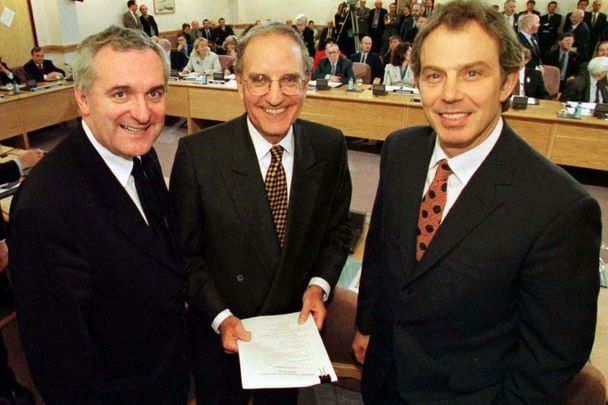The one constant of the troubles in Ireland, Israel, and Palestine is that the more a security solution is sought, the less secure the parties in the region become.
In Ireland, it was not until the parties engaged fully, under American eyes, that the breakthroughs of the peace process became evident.
The success of the Irish peace process was also predicated on the fact that a military solution was impossible. At various times in the 30-year war, the IRA thought it had the British on the ropes and, likewise, the British military talked up the notion that it had the IRA defeated and just one final push was needed. Such a recognition would transform Middle East thinking.
Both sides in Ireland came to recognize the error of their thinking and created a space for political negotiations.
Some of the lessons of the Irish peace process could be helpful here. US Senator George Mitchell, who chaired the peace talks in Northern Ireland, has emphasized that the implementation of historic agreements "is as difficult and as important as reaching them." Yet in Northern Ireland and the Middle East, the signing of the Good Friday Agreement and the Israeli-Palestinian Declaration of Principles were seen by many on both sides as an end in themselves.
Mitchell was later appointed as the US Special Envoy for Middle East Peace but was never granted the authority by President Obama to command the stage and drive change as he did in Ireland under Clinton. There were simply too many other peace negotiators.
In both peace processes, the American role was and is critical as is the work of the various diasporas. Irish Americans were successful in creating a scenario where an American president took an active interest in seeking a negotiated settlement in Ireland and introduced a powerful new player. The US visa for Gerry Adams was a transforming moment as was delivering the August 31, 1994 ceasefire.
Clinton would often remark that if it had been Adams, not Arafat, dealing with the Oslo peace initiative, it could have been delivered, making the point that Arafat was never in full control of his faction as Adams was within the Republican movement.
Clinton's impact on the Irish peace process was enormous, but he insisted on one crucial detail. He remained scrupulously neutral and was equally approachable to both sides. This allowed him to carry enormous moral persuasion at key points, such as the appointment of Senator Mitchell to chair the all-party talks in 1996 and convincing reluctant party leaders on both sides to sign up to the Good Friday Agreement.
The Biden tilt toward Israel was the President’s only option given the savagery of the Hamas assault on civilians.
But that is coming under great pressure. The Israel lobby in the US is where a major battle is looming. The Israeli lobby AIPAC remains fixed on maintaining the US government's pro-Israel tilt. Far more valuable would be a questioning American constituency, not afraid to query what the leaders back in the homeland are doing.
That scenario is not impossible. There are new faces on the block, young progressive activists, many moderate Jews who seek to ensure a more balanced Palestinian line. If they succeed, they will be a very important outside-the-box player going forward as Irish America was.




Comments